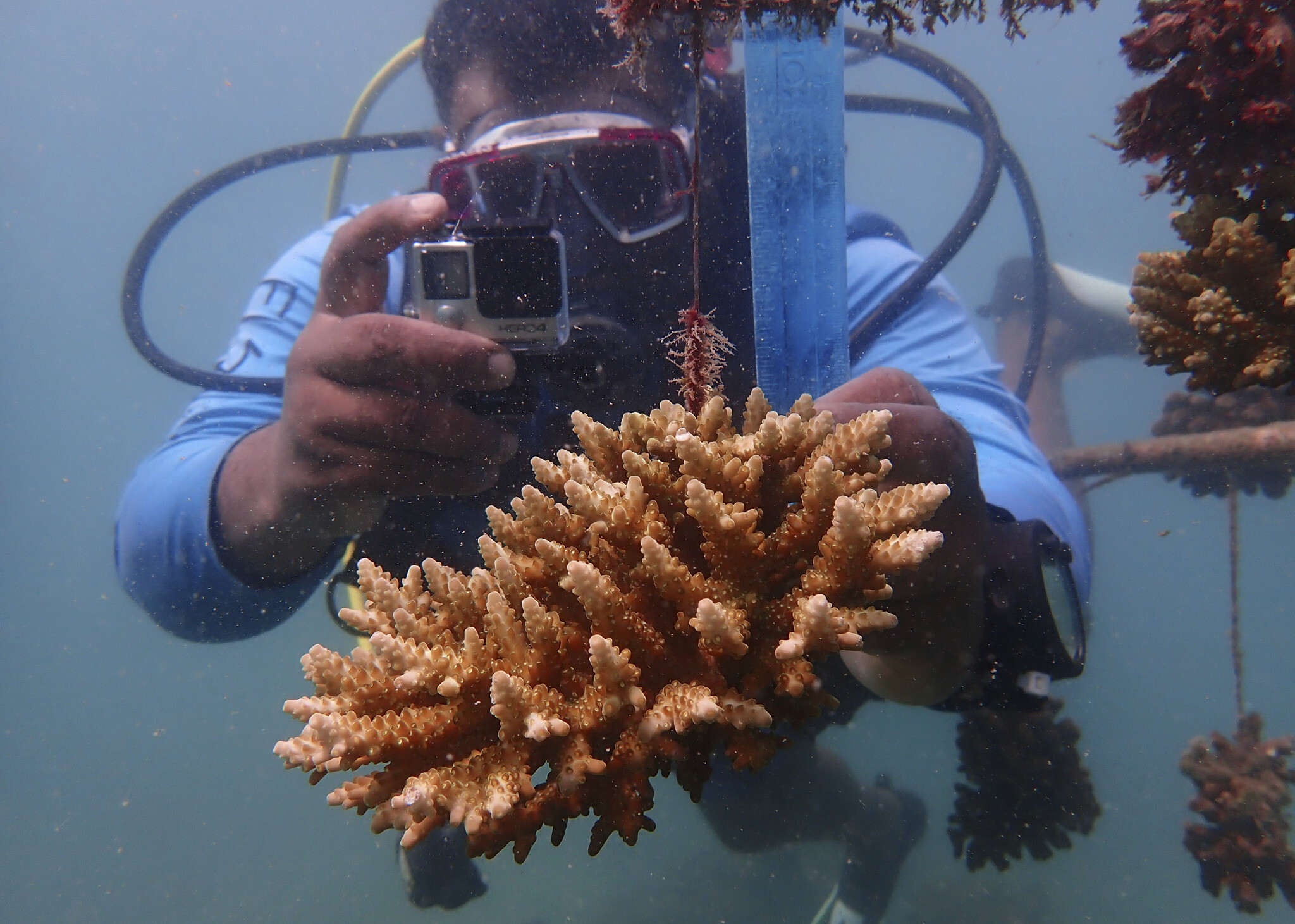Protecting life in the high seas
Saturday 11 March 2023 | Written by Thomas Tarurongo Wynne | Published in Features, Opinion

Coral reef restoration ranger Yatin Patel measures an artificial reef structure in the Indian Ocean near Shimoni, Kenya on June 13, 2022 (AP Photo/Brian Inganga)/23031030
We must find that balance to utilise and protect our environment, our seas, our land, our fish, our forests and our seabed, because this has been how we as people of the Moana have maintained and sustained ourselves for generations, writes Thomas Tarurongo Wynne.
In July 1974, then prime minster of the Cook Islands, Albert Henry spoke to the UN at the Third United Nations Conference on the Law of the Sea, where he said and quite prophetically – “The government of the Cook Islands realises that in the future the sea could become a dominant factor in the development of the Cook Islands economy”. Aware as he was not only of the bounty below the Ocean with the resource of fishing and fisheries, but also of the potential bounty that lay on the bottom of the Ocean with our manganese nodules.
Henry went on to say, “With the advance in technology the discovery and extraction of minerals from the seabed around our Islands may become a possibility, and in the event of that possibility becoming a reality it would only be fair and just for the Cook Islands to receive benefits from the seabed immediately around its Islands.”
His words came to mind as the ship, the Anu Anua Moana, left our shores to do just that, to explore the sea floor, as the technology to explore has now arrived, and just this week another ship, didn’t leave but arrived at the United Nations, as a Treaty of the High Seas was agreed upon. The High Seas Treaty was described by Marine Biodiversity of Areas Beyond National Jurisdiction president Rena Lee as “the ship has reached the shore”, a ship that has taken decades to come to agreement.
The Anu Anua Moana left our shores in Avatiu to do what Albert Henry could only have imagined could be possible nearly 40 years later and decades later also that same UN he spoke to, celebrated a ship, a metaphorical ship arriving to protect the world’s “high seas”.
We must find that balance to utilise and protect our environment, our seas, our land, our fish, our forests and our seabed, because this has been how we as people of the Moana have maintained and sustained ourselves for generations, and we knew how to do this in traditional ways and methods that ensured the land, the ocean and the skies were there also for generations to come. Sadly governments have not always understood this and an industrialised world, driven by greed, capitalism and profit has used the world and its God given resources to plunder and poison, with little regard for the damage it has created, and a climate crisis, not change we all are now confronted by and immersed in.
And as we globally reap the harvest, of seeds planted by generations of governments driven by profit over people and environment, decisions that have resulted in a climate crisis, that has seen sea levels rise, cyclones hit Aotearoa and now Vanuatu; the Ocean, collectively the wind, the tides and the planet are clearly saying enough is enough. The seeds we plant today, as any planter or grower will know, are not the fruit we will eat tomorrow. And the fruit we are eating, the bitter fruit of an earth, is shouting at us to make better decisions, to protect and look after them and to no longer put profit before the environment.
The High Seas, which is an area of Ocean that covers nearly two thirds of the global Ocean and almost half of the entire earth’s surface, has been ravaged by overfishing and pollution. This vast chunk of the Moana has sadly remained unprotected until now, with the agreement to now protect our Blue continent that does not belong to any one country. The Treaty process though agreed is not final, as it must now move through its technical stages, before it can enter into full force.
The balance between extracting resources, be they on the land or in the Ocean or below the Ocean, must be done in a way that provides and protects, that puts food on the table for today and tomorrow, and allows our environment to replenish and restock before we take from it again. Our Tupuna showed us how, and it is these same principles of tiaki, raui, akatapu and being good stewards of what God has given us that will ensure that when my grandchildren and yours sit at the table to eat long after we are gone, that the tuna will be plenty when the fishing boats come in, the maroro will still be at the market, the taro will still produce from the swamp lands and that the Ocean will still be able to give us what we need and also what she needs to reproduce of itself again – that is our solemn responsibility today and to an ever increasingly uncertain tomorrow.




















































